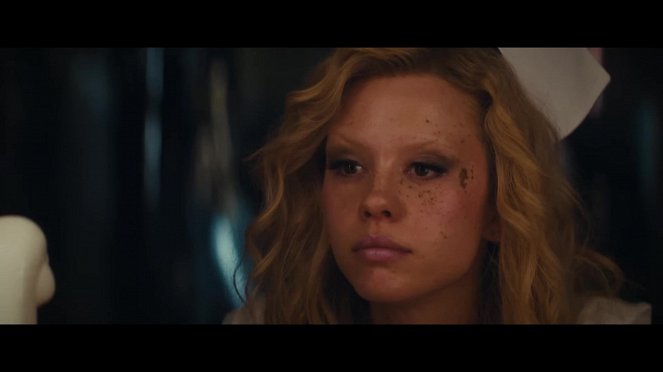Réalisation:
Ti WestScénario:
Ti WestPhotographie:
Eliot RockettMusique:
Tyler BatesActeurs·trices:
Mia Goth, Elizabeth Debicki, Lily Collins, Michelle Monaghan, Bobby Cannavale, Kevin Bacon, Giancarlo Esposito, Halsey, Moses Sumney, Uli Latukefu (plus)Résumés(1)
À Los Angeles dans les années 80, Maxine Minx, une star de films pour adultes et aspirante actrice, obtient finalement le rôle tant espéré. Mais lorsqu’un mystérieux tueur traque les starlettes d’Hollywood, des indices sanglants menacent de dévoiler le sombre passé de Maxine. (VVS Films)
Critiques (2)
Ti West conclut ainsi sa trilogie texano-hollywoodienne libre et on peut désormais y voir une sorte de parabole. Avec X, West nous éblouissait avec un style visuel rétro très réussi, même si le scénario simpliste nous laissait sur notre faim. Puis est venu Pearl, une étude de caractère horrifique assez admirable et le point culminant (ou l'anomalie) de la trilogie entière, voire de tout le catalogue du réalisateur. Avec MaXXXine, West revient en quelque sorte au début, soit à la victoire de la forme sur le fond, le tout semblant légèrement bâclé et inachevé sur le papier. Peut-être que le réalisateur est un peu à court d'idées ? Mais ça reste malgré tout un bon moment de divertissement, avec des visuels impressionnants et une représentation crédible du milieu des années 80. Ti West n'a jamais été un scénariste de haut vol, mais il aime le cinéma, aime la réalisation et aime aussi citer les classiques du genre. Après l'excellent Pearl, une légère déception, mais toujours un bon spectacle sans prétention. [KVIFF 2024]
()
Ti West completed his trilogy of horror movies starring Mia Goth with a spectacular ultra-pastiche that in a certain respect not only tops off the series and the director’s filmography to date, but also the entire filmmaking tradition of decadent genres. Since time immemorial, all trash filmmakers have longed for acceptance and recognition, which means studio facilities and shooting in Hollywood. West’s trilogy about the alluring nature of filmmaking and promises of fame ends there. The director absolutely delights in the eclectic composition of allusions and references. His film radiates enthusiasm for the high and the low, thus setting side by side allusions ranging from porn to Chinatown, from American trash to giallo, and from Psycho to The Long Goodbye. Taking full advantage of the fulfilled dream of making his film under the wing of the celebrated Universal Studios, he stages a fannish tour of not only iconic locations in L.A., but mainly Universal’s outdoor sets. In so doing, he recalls the VHS era, highlights genre movies made by ambitious female directors and settles accounts with the religionists and moralists who protested against trash filmmakers and their works in the 1980s. However MaXXXine still primarily remains a hedonistic genre fantasy that doesn’t aim for historical accuracy (e.g. female directors were given room to work by Corman, not by the major studios). The main denominator here is the filmmaker’s own joy and, ideally, that of viewers having the same mindset. We could reach for the word Tarantino-esque, but that would be inadequate and limiting in any case. Because whereas Tarantino makes ultimate paraphrases of his favourite genres by ingeniously twisting iconic moments with his screenwriting, West outright composes an enthusiastic tribute that makes do with a fetishistic reconstruction that isn’t much more sophisticated than its inspirations in terms of screenwriting, but is joyfully informed by those films and enthusiastically revels in the possibilities that present themselves (which is perfectly confirmed by the closing vanity shot).
()

